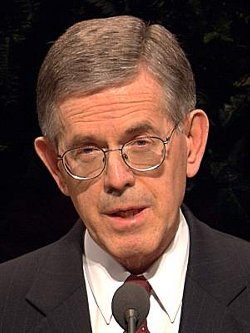Bruce C. Hafen
Bruce C. Hafen is a General Authority and member of the First Quorum of Seventy of The Church of Jesus Christ of Latter-day Saints. Elder Hafen was born on October 30, 1940, in St. George, Utah.[1]
Elder Hafen is a nationally recognized scholar on family relationships, children, and education. He earned a juris doctorate from the University of Utah and is a former dean of Brigham Young University’s J. Reuben Clark Law School. He helped establish BYU’s law school in 1973, teaching on the school’s first faculty. From 1978 to 1985, he was president of Ricks College (now BYU-Idaho), always teaching one class each semester. In 1989 he became provost at BYU, the number-two administrator at the university.[2]
Bruce C. Hafen has been a member of the First Quorum of the Seventy since 1996, having served in bishoprics, stake presidencies, and recently as Area President of the Australia/New Zealand area. He served a mission in West Germany. He married Marie Kartchner on 2 June 1964 in the St. George Temple, and they have seven children and 10 grandchildren (one deceased).
Elder Hafen is known to Mormon readers for his frequent Ensign articles and his bestselling trilogy on the Atonement, which includes the award-winning book The Broken Heart.
Contents
Books by Bruce C. Hafen
- A Disciple's Life: The Biography of Neal A. Maxwell
- Covenant Hearts: Marriage And the Joy of Human Love
- The Broken Heart: Applying the Atonement to Life's Experiences
- The Belonging Heart: The Atonement and Relationships with God and Family
- The Believing Heart: Nourishing the Seed of Faith
- Spiritually Anchored in Unsettled Times
- "Beauty for ashes" and The restored doctrine of the atonement (Classic talk series)
- Law and the Ordering of Our Life Together (Encounter Series)
by Bruce C. Hafen, Thomas L. Shaffer
Quotes by Bruce C. Hafen
- "We can have eternal life if we want it, but only if there is nothing else we want more. "
- "In the long run, our most deeply held desires will govern our choices, one by one and day by day, until our lives finally add up to what we have really wanted most--for good or otherwise. We can indeed have eternal life, if we really want it, so long as we don't want something else more."
